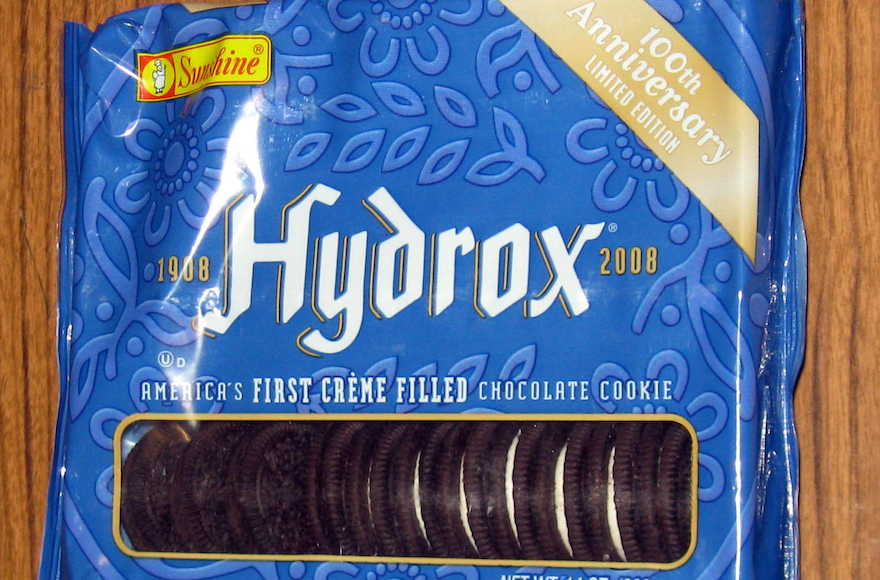Hydrox, the original kosher sandwich cookie, is accusing Oreo of sabotage
Published August 10, 2018

On the 100th anniversary of Hydrox in 2008, Kellogg’s briefly resumed distribution of the original sandwich cookie under the Sunshine label. (Wikimedia Commons)
(JTA) — You know what Oreos are.
ADVERTISEMENT
They’re two delicious chocolate circles and a creme filling. They’re regular, double-stuff, vanilla, birthday cake and pumpkin spice (really). There is debate on how they should be eaten, but everyone knows they’re best when dunked in milk.
What you might not know is that Oreos are just a copycat of Hydrox, a sandwich cookie first sold in 1908, four years before the first Oreos appeared on shelves. Even though (or maybe because?) they came second, Oreos came to dominate the market, becoming a fixture in America’s grocery stores.
But for most of the past century-plus, Hydrox has held on. And at least in part, that’s because of the Jews.
Until a glorious day in 1998, Hydrox was the premiere kosher sandwich cookie on the market, while Oreos remained treyf, lacking a kosher heksher, or seal of approval. Growing up, I genuinely though Hydrox cookies were knock-off Oreos produced specifically for religious Jews. Oreos were the forbidden fruit, and I still vividly remember when, shortly after they became kosher certified, my mom snagged a sleeve of Oreos from a Jewish event.We gobbled them up.
Hydrox stopped production in 2003, giving Oreo 12 years of a monopoly, give or take a 100th anniversary promotion by Hydrox’s then maker, Kellogg’s. A Pax Oreana, if you will. But in 2015, Hydrox, now part of Leaf Brands, sprang back like a phoenix, and has been trying to duke it out with Oreo, David and Goliath style.
And now, it’s taking that battle to the government.
ADVERTISEMENT
Hydrox posted on Facebook that it has filed a formal complaint with the Federal Trade Commission, accusing employees of Oreo’s parent company, Mondelez, of blocking Hydrox from view when it stocks Oreos on supermarket shelves. The Facebook post says Mondelez uses a system called “direct store distribution,” where employees of the brand, rather than supermarket attendants, stock the food. This allows the Oreo stockers to push Hydrox aside when they place Oreo boxes on t he shelves.
Loyal Hydrox customers have sent in pictures of the cookies being boxed out by Oreos, moved behind other products or otherwise obscured from customers. Hydrox claims a major supermarket chain brought the problem up at a meeting.
“We believe in competition and choice but we firmly believe the folks @Mondelez (the owners of Oreo) have been undertaking a national program to damage our brand and stop us from competing,” Hydrox’s posts says. “Many of you over the last few years have been great at taking pictures when you see #hydroxcookies being moved or blocked from store shelves and we really appreciate your help.”
But Mondelez sounds unconcerned about the complaint, telling Gizmodo that it is “confident that this accusation has no merit. The OREO brand is an iconic one, with a proud and rich history of delivering great tasting products and exciting innovations to our consumers for more than a century. This focus, and our commitment to operating with integrity, has made OREO America’s favorite cookie.”
So who will win, the original kosher sandwich cookie, or the giant it’s fighting? Only time — and maybe a government agency — will tell.















